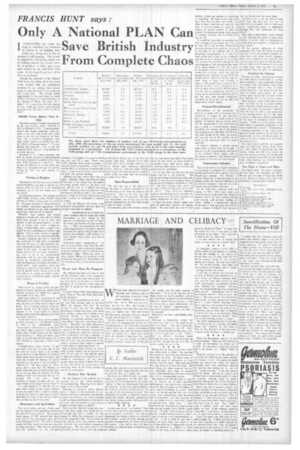Page 5, 12th August 1938
Page 5

Report an error
Noticed an error on this page?If you've noticed an error in this article please click here to report it.
Tags
Share
Related articles
The Meaning Of Celibacy: Readers Reply To Fr. Davis
Doubts 2_ Queries Ul
Why Clerical Celibacy Is The Church's Practice
Marriage And Cel/bac
Don't Blame Celibacy For Child Abuse
MARRIAGE AND CELIBACY
By Father C. C. Martindale
WE have been asked to write about Marriage and Celibacy, and, to add something of practical value about children or adolescents in holiday time. As for Marriage and Celibacy, we say this, first: the Council of Trent denounces those who deny that Celibacy is a "higher state " than matrimony. But this means, obviously, Celibacy chosen for the sake of God and of Christ.
No one supposes that the embittered (or even sweet yet disappointed) spinster in a boarding-house, or the blue-nosed bachelor sipping sherry in a St. James' club-window, is in a higher state than the hard-working father or mother of a family who have, after all, received a Sacrament that they have not. If you are reduced to celibacy because everyone refuses you, or because nobody asks you, that is (or may be) your bad luck (or their happy fortune); but you are not, for that, in a higher state.
But if you are called, by God, to a higher degree of renunciation for His sake, that puts you (if you correspond) on to a higher " plane," if but you understand what you are called to. A priest or a nun is called to the complete giving-up of normal life, for the sake of the direct service of God. The abdication of all that is normal to human satisfaction-home; physical partnership; total human companionship; self-expression in one's bodily offspring.
• • • •
A priest must be so " spiritualised " that, to him, every one of his parishioners is his son or daughter " in Christ ": he will not degenerate into being a lonely or crochety old bachelor: a nun will never become an ignorant, unsympathetic, let alone neurotic, old spinster. They will be more, not less. Enriched, not impoverished. All-embracing, not limited. No wonder that the priest requires a Sacrament, if he is to be, and live up to being, what is so wholly unselfish: and we have sometimes wondered whether theology (500 years hence) will not discover a way of showing that a nun's renunciation-for the sake of a higher " implementation "may enter somehow indirectly into what is " sacramental."
Meanwhile, we must undoubtedly praise marriage.
Marriage is humanwise normal-the Scriptures say that " it is not good for the man to be alone ": Eve was created that Adam might become his true self. Short of that vocation to self-sacrifice, man, without a wife, is only half a self. "Half a Man," as Dinnis's Australian poem described the man who had been shot up in the War thought that he was-but, of course, turned out not to be.
• • • •
During the war most of our best friends were either made or killed. Our soul has been seared, or again, has received new life, from these two facts. We krfew many, to whom the ideal of self-control, or even decency, was then alien. They have found their true selves in perfect marriages. We knew others, for whom marriage was for ever impossible, men ready to commit suicide from humiliation, who were rescued into a life of incomparable service.
The point is-not that the body is " bad," nor its instincts, nor its duly controlled performances: not that we are with those whom St. Paul denounces as forbidding to marry and commanding to abstain from meats-as though married life, and even eating, were materialistic, and therefore bad, in themselves: not that marriage (if you are called to it) is inevitably a poor second-rate-how often have I been humbled to my very knees by acquaintance with married couples, about whom I could but say: " If only I did my job as well as they do: if only I worked as hard as they: if only I lived up to my responsibilities as they do: if only I could be sure that haven't an easier duty than theirs is: if only 1 were clear that I impose upon myself rules and demands as difficult as those which, in the name of the Church, I (quite properly) declare to them." I begin with the simple fact that 1 have only to walk downstairs to say Mass. They may have to walk in the rain two miles.
I at once counter this by saying that plenty of priests have to do much more; • • • • In Australia, I knew a priest who, of course, had to say two Masses on a Sunday. On the first Sunday of the month his second Mass was 35 miles from his first. On the second, I think, 42. On the third and fourth, I forget: but they were further off. On the fifth Sunday, when there was one, he had to go 98 miles-and by "roads" -driving himself, of course.
I wish that all priests were allowed (as in parts of France and elsewhere) to say three Masses per Sunday whenever desirable, and that they were ordered to take liquid non-alcoholic nourishment between each. Ordered : not " allowed." Not long ago, the average death-age of an Australian priest was 50. " Magnificent," but it isn't the Church's warfare! Silly, in short. My point is: Marriage can be-but, thank God, often is not-an easy, conventional option. But if it is what Catholic Marriage insists that it must be, a Permanent Free Contract between Two, it becomes the material of a Sacrament, just as water does in baptism, or bread and wine in the Eucharist. Bride and bridegroom marry one another. Their first mutual marriage present is Grace.
The priest, representing the Church (that is, Christ), assists at, witnesses, and gladly blesses, their contract, but they make it. They are the Ministers of this Sacrament, as much as the Bishop is in Ordination.
• • • •
These two Sacraments ought to be considered together. Marriage and Ordination -both are Sacraments-to which am I called? If I am called to marriage, for me that is the proper, i.e., " higher " walk in life.
Whatever celibacy is in the abstract, it is not for me, and I am not a mere secondrate because it isn't. Of course, we could heap up reasons-in which we wholeheartedly, even from experience, believe, for proving that celibacy in or out of the " foreign missions " is the only proper path for priests. But we are trying to get behind what is immediately useful, to what is eternally valuable, which is, wholehearted self-sacrifice for Christ and union with Him in Mass-that is, upon Calvary.
Dare I say that I, because celibate, am better than Pier Giorgio Frassati, whom the Pope would like to see canonised, and who wanted to get married and have " lots of children "? Most certainly not. I am sure that he would have done better in his vocation than I do in mine. The " higher" road of celibacy would not have been higher for him. In the abstract, anything " unearthly " is the better: in the concrete, i.e., in regard of so and so, it need not be.
I have left myself but little room to talk about camps, etc. I begin with the brutal fact that I myself, as a child,,required to be removed every year from my parents' town-house to the country so that I might have the chance of breathing decent air.
I assume then that everyone, especially women and children, ought to get out of congested areas into places where they can breathe properly. Of coorse, I know lots of elderly women who had never seen the sea, and who didn't like it when they did. And of girls who hate the sight of fieldsfields look green (an unaccustomed colour), damp, and empty. They want to be back in the , cosy one-on-the-top-of-the-other suffocation of home.
Practical persons must deal with thatalso, persons who understand that mentality, It remains; I think that our Catholics ought to think out a way of creating, and managing, boys' and girls' clubs, camps, or whatnot in that line-and I am perfectly clear that if they do not, they are deliberately handing over the job to those whom we roughly call Protestants. But here is, as so often, what needs, I feel, national consideration by us. I fear that by constantly subdividing our work-parochially, even diocesanly-we weaken it. We would welcome the handing over of this problem, for example, to the Knights of St. Columba, working in union with the S.V.P., and that they be instructed to make a national survey; to find out where such camps, holiday homes, etc., were most needed and would he best appreciated, and then to submit a scheme by which the maximum of children could be arranged for at minimum expense, and to discuss also, details like transport and catering. The hierarchy would then criticise this and appoint suitable chaplains. Thus much could be done, whereas, I think, the good -work already being done is bound to be but patchy.
blog comments powered by Disqus

















